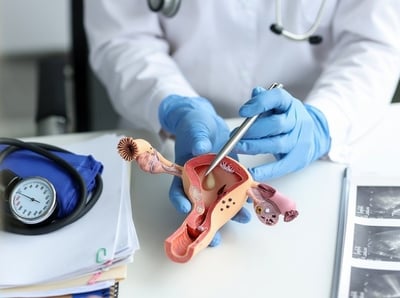A Study of Targeted Therapies for Patients With Recurrent Endometrial Cancer

Treatment
Phase 2 treatment study for recurrent endometrial cancer
Clinicaltrials.gov identifier:NCT04486352
Study Contact Information:
For additional information, please contact by phone at (617) 732-8727
or by email.
About the Study
This study is to test the safety and effectiveness of different kinds of with or without atezolizumab (or Tecentriq) in individuals with recurrent endometrial cancer. Participants will be placed into study groups based on their tumor.
This Study is Open To:
Women 18 years or older who:
- have a life expectancy of more than 12 weeks
- have recovered from effects of recent chemotherapy, radiation, or surgery
- have a tumor sample
- have recurrent endometrial cancer which has recurred after at least one but no more than two prior forms of therapy
This Study is NOT Open To:
Patients with:
- other invasive cancers within the last five years
- an active or history of autoimmune disease or immune deficiency
- active tuberculosis
- have significant heart disease
- have received a live vaccine in the last four weeks
- have had a severe infection within the last four weeks
- have had prior bone marrow transplant or antibiotic medication through the vein within the past four weeks
- More exclusion criteria found on clinicaltrials.gov
What the Study Involves
The study involves 6 groups:
Group 1:
Participants will receive Tecentriq intravenously (injected into the vein) on Day 1 of each cycle and bevacizumab (Avastin) intravenously every two weeks of the 28-day cycle.
Group 2:
Participants will receive Tecentriq intravenously (injected into the vein) on Day 1 of each cycle and Ipatasertib orally once daily for 21 days of the 28-day cycle.
Group 3:
Participants will receive Tecentriq intravenously (injected into the vein) on Day 1 of each cycle and (or ) orally once daily for every day of the 28-day cycle.
Group 4:
Participants will receive Tecentriq intravenously (injected into the vein) on Day 1 of each cycle and Trastuzumab emtansine (or Kadcyla) intravenously on Day 1 of each 21-day cycle.
Group 5:
Participants will receive Tecentriq intravenously (injected into the vein) on Day 1 of each cycle and Tiragolumab intravenously on Day 1 of each 28-day cycle.
Group 6:
Participants will receive Inavolisib and Lentrozole (or Femara) orally once daily for every day of the 28-day cycle.
Study Contact Information:
For additional information, please contact by phone at (617) 732-8727
or by email.
Locations:
California
City: San Francisco RECRUITING
Facility: UCSF Helen Diller Family Comprehensive Cancer Center
Contact Info:
Edwin Alvarez, MD
District of Columbia
City: Washington D.C. RECRUITING
Facility: Medstar Georgetown Cancer Institute
Contact Info:
Ebony Hoskins, MD
Florida
City: Miami Beach RECRUITING
Facility: Mount Sinai Comprehensive Cancer Center
Contact Info:
Brian Slomovitz, MD
Illinois
City: Chicago RECRUITING
Facility: University of Chicago
Contact Info:
John Moroney, MD
Kansas
City: Westwood RECRUITING
Facility: University of Kansas Cancer Center
Contact Info:
Andrea Jewell, MD
Massachusetts
City: Boston RECRUITING
Facility: Dana Farber Cancer Institute
Contact Info:
Joyce Liu, MD, MPH
Maine
City: Scarborough RECRUITING
Facility: Maine Medical Center
Contact Info:
Minnesota
City: Minneapolis RECRUITING
Facility: University of Minnesota
Contact Info:
Britt Erickson, MD
North Carolina
City: Durham RECRUITING
Facility: Duke University Cancer Center
Contact Info:
Angeles Alvarez Secord, MD
Nebraska
City: Omaha RECRUITING
Facility: Nebraska Methodist Hospital
Contact Info:
Brent Tierney, MD
New Jersey
City: Morristown RECRUITING
Facility: Atlantic Health Systems/Morristown Medical Center
Contact Info:
Nana Tchabo, MD
New York
City: New York RECRUITING
Facility: Weill Cornell Medicine
Contact Info:
Evelyn Cantillo, MD, MPH
Oklahoma
City: Oklahoma City RECRUITING
Facility: University of Oklahoma Health Stephenson Cancer Center
Contact Info:
Debra Richardson, MD
Oregon
City: Portland RECRUITING
Facility: Providence Portland Cancer Institute
Contact Info:
Christopher Darus, MD
Rhode Island
City: Providence RECRUITING
Facility: Lifespan - Rhode Island Hospital
Contact Info:
Don Dizon, MD
Treatment
Phase 2 treatment study for recurrent endometrial cancer
Clinicaltrials.gov identifier:NCT04486352
Study Contact Information:
For additional information, please contact by phone at (617) 732-8727
or by email.